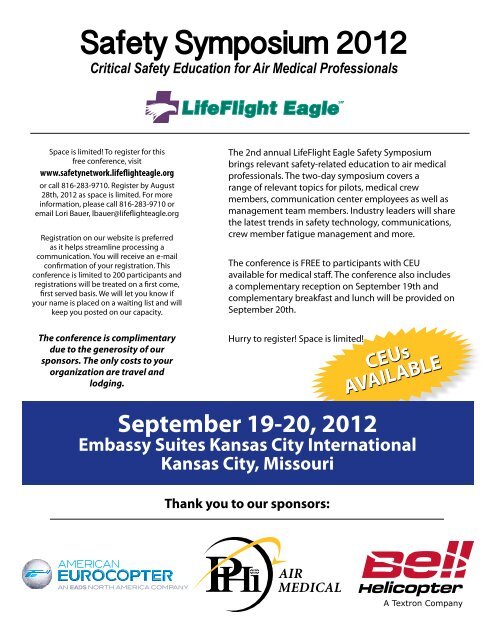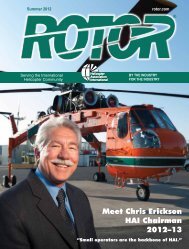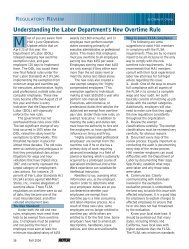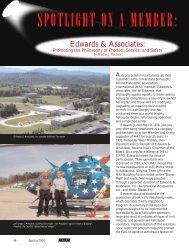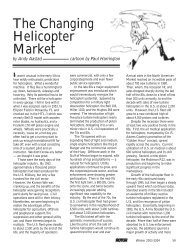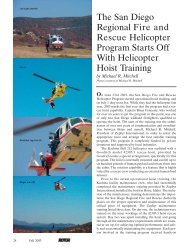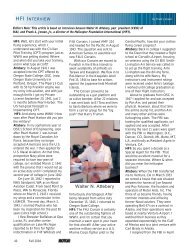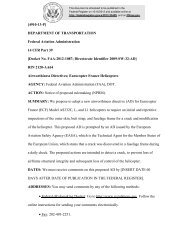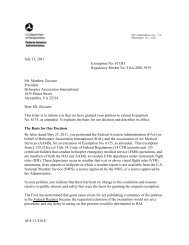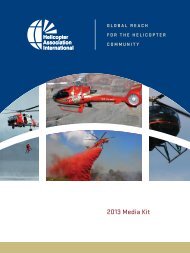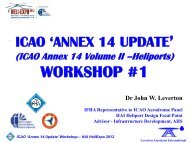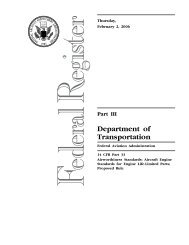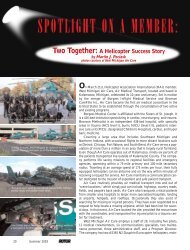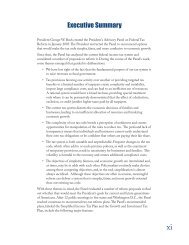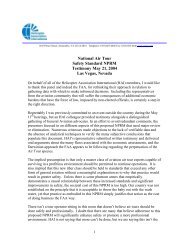Safety Symposium 2012 - Helicopter Association International
Safety Symposium 2012 - Helicopter Association International
Safety Symposium 2012 - Helicopter Association International
You also want an ePaper? Increase the reach of your titles
YUMPU automatically turns print PDFs into web optimized ePapers that Google loves.
<strong>Safety</strong> <strong>Symposium</strong> <strong>2012</strong><br />
Critical <strong>Safety</strong> Education for Air Medical Professionals<br />
Space is limited! To register for this<br />
free conference, visit<br />
www.safetynetwork.lifeflighteagle.org<br />
or call 816-283-9710. Register by August<br />
28th, <strong>2012</strong> as space is limited. For more<br />
information, please call 816-283-9710 or<br />
email Lori Bauer, lbauer@lifeflighteagle.org<br />
Registration on our website is preferred<br />
as it helps streamline processing a<br />
communication. You will receive an e-mail<br />
confirmation of your registration. This<br />
conference is limited to 200 participants and<br />
registrations will be treated on a first come,<br />
first served basis. We will let you know if<br />
your name is placed on a waiting list and will<br />
keep you posted on our capacity.<br />
The 2nd annual LifeFlight Eagle <strong>Safety</strong> <strong>Symposium</strong><br />
brings relevant safety-related education to air medical<br />
professionals. The two-day symposium covers a<br />
range of relevant topics for pilots, medical crew<br />
members, communication center employees as well as<br />
management team members. Industry leaders will share<br />
the latest trends in safety technology, communications,<br />
crew member fatigue management and more.<br />
The conference is FREE to participants with CEU<br />
available for medical staff. The conference also includes<br />
a complementary reception on September 19th and<br />
complementary breakfast and lunch will be provided on<br />
September 20th.<br />
The conference is complimentary<br />
due to the generosity of our<br />
sponsors. The only costs to your<br />
organization are travel and<br />
lodging.<br />
Hurry to register! Space is limited!<br />
CEUs<br />
AVAILABLE<br />
September 19-20, <strong>2012</strong><br />
Embassy Suites Kansas City <strong>International</strong><br />
Kansas City, Missouri<br />
Thank you to our sponsors:
At a Glance<br />
Wednesday, Sept. 19<br />
1300 – 1400 Registration<br />
1400 – 1500 Fatigue in<br />
Aviation, Thomas Nesthus<br />
1500 – 1515 Break<br />
1515 – 1615<br />
Communication Specialists:<br />
Are They Really Needed?,<br />
Clayton Hummer<br />
1615 – 1630 Break<br />
1630 – 1800 Regionalizing<br />
Best Practice in the Delivery<br />
of HEMS: Perils and Pitfalls,<br />
Thomas Judge<br />
1800 – 1830 Break<br />
1830 Reception<br />
Thursday, Sept. 20<br />
0700 – 0800 Breakfast<br />
0800 – 0900 Applied <strong>Safety</strong><br />
Technology, Chris Bryant<br />
0900 – 0915 Break<br />
0915 – 1030 Clinical<br />
<strong>Safety</strong> in Transport – Who<br />
is minding that store?,<br />
Michael Frakes<br />
1030 – 1045 Break<br />
1045 – 1145<br />
Communication, Terry<br />
Palmer<br />
1145 – 1300 Lunch<br />
1300 – 1415 <strong>Safety</strong>’s Top<br />
10 Killer Attitudes, Rex<br />
Alexander<br />
Wednesday, September 19th<br />
1300 – 1400 Registration<br />
1200 – 1500 Fatigue in Aviation - Dr. Thomas E. Nesthus, Ph.D.<br />
Presentation materials will provide a fundamental knowledge about fatigue and practical recommendations<br />
for fatigue management and prevention.<br />
Focus areas include basic background information on fatigue and circadian rhythms, introduction to sleep and<br />
sleep management, relationship to aviation and the potential for negative outcomes, introduction to fatigue<br />
management strategies and fatigue countermeasures.<br />
Dr. Thomas E. Nesthus, Ph.D., is an Engineering Research Psychologist for<br />
the Federal Aviation Administration’s Civil Aerospace Medical Institute.<br />
Dr. Nesthus worked for the USAF Crew Technology Division, Brooks Air<br />
Force Base, TX from 1986-1992. He supervised diverse aerospace medical<br />
research projects and was principally responsible for providing human<br />
factors performance research support to the Sustained Operations Branch,<br />
Flight Motion Effects Branch, Cockpit and Equipment Integration Lab,<br />
and High Altitude Protection Function of the USAF Armstrong Research<br />
Laboratory. He was hired by the FAA Aerospace Human Factors Research<br />
Division in 1992. Current focal research activities include evaluation of<br />
fatigue and performance associated with flight and cabin crewmembers,<br />
ATCSs, TechOps, and aviation maintenance technicians. He participates on<br />
numerous performance and fatigue-related DOT and interagency working groups. He’s chaired<br />
the Aerospace Medical <strong>Association</strong>’s Human Factors Committee and the DOD Human Factors<br />
Engineering, Sustained and Continuous Operations Technical Advisory Group. He provides assistance<br />
as requested by the National Transportation <strong>Safety</strong> Board and the Department of Justice.<br />
He testified on the fatigue factors associated with the crash of Colgan Air Flight 3407 during the<br />
NTSB’s public hearing (May 2009). He is currently assisting the Flight Standards Service - Air<br />
Transportation Division with 14 CFR Parts 117 and 121 Flightcrew Member Duty and Rest<br />
Requirements.<br />
1500 – 1515 Break<br />
1515 – 1615 Communications Specialists: Are they really needed? - Clayton<br />
Hummer, President of NACCS<br />
Are we really needed anymore? Pilots don’t really want to talk to us. Flight crews recognized trends that the<br />
Specialist fail at. Bad LZ information. Is it really four to go, one to say no?<br />
Communication Specialists, do we support the mission? What is our current role in the center? Involved the<br />
safety of the flight? Are we needed..? Yes… we are…<br />
Clayton Hummer’s aviation career started in 1974 spraying crops with a<br />
Bell 47G on the family farm.<br />
Ever since then, Clayton has been involved in aviation with certificates held<br />
as a Commercial- Rotorcraft, CFII-Rotorcraft.<br />
He has provided instruction to pilots transitioning to turbine helicopters<br />
and instrument instruction and has acted as a safety pilot. Clayton worked<br />
as a pilot in the Gulf of Mexico supporting the oil and gas industry in the<br />
late 90’s.<br />
Today Clayton uses his expertise as an aviator in his current role as Communication<br />
Supervisor at a busy Communication Center to promote the<br />
role of the Flight Communicator in the Aeromedical Community.<br />
He is the sitting President for the National <strong>Association</strong> of Aeromedical Communicators and is<br />
the Chair of the Education Sub Committee for AMTC in Seattle <strong>2012</strong><br />
As a pilot and a Communication Specialist, Clayton brings a unique look at the role and interactions<br />
of the Communication Specialist and flight crews.<br />
He lives and works in Springfield, Mo.<br />
1615 – 1630 Break
1630 – 1800 Rationalizing Best Practice in the Delivery of HEMS: Perils and Pitfalls<br />
- Thomas Judge, Executive Director of LifeFlight of Maine<br />
While the public debate continues, the foundations, structures, and governance of healthcare are rapidly<br />
changing. Although the role medical transport will play in the transformation of healthcare is still uncertain,<br />
the need for higher levels of quality, capability, reliability, cost effectiveness, and safety are clear. By nature,<br />
HEMS is a high consequence endeavor, the presentation will examine strategies within and across state borders<br />
to define and implement best practices in safety and quality between different providers.<br />
Learning Objectives include understanding tectonic plates in healthcare change and their<br />
relationship to medical transport, understanding internal and external economic efficiencies,<br />
understanding sharing services in a competitive environment and understanding strategies of<br />
navigating through political and economic change.<br />
Thomas Judge serves as the Executive Director of LifeFlight of Maine, a<br />
non-profit hospital consortium critical care system serving over 40 hospitals<br />
in Maine and New England. In addition, Judge serves as the Executive<br />
Director of the LifeFlight Foundation, a non-profit charity that funds aviation<br />
infrastructure and outreach education services.<br />
Judge brings a thirty-year background in pre-hospital emergency medical<br />
services in roles from provider to system planner/regulator. He has served<br />
as a subject matter expert for the National Transportation <strong>Safety</strong> Board, the<br />
Air Medical Expert Panel for the State of Maryland, and is a member of the<br />
Federal Department of Transportation National EMS Advisory Council.<br />
He has also served a subject matter expert for Institute of Medicine and the<br />
Government Accountability Office. Former Board Chair of Maine EMS, the State Regulatory and<br />
Licensing Agency, Judge has worked extensively in both the public and non-government sectors.<br />
Judge has been involved in EMS program developments and lectured across the US as well as<br />
projects in the UK, Ireland, Canada, Denmark, and South Africa. He is an active professional<br />
member of the National <strong>Association</strong> of EMS Physicians, a faculty member of the National Medical<br />
Directors Course and Practicum, a founder ambulance member of the Faculty of Pre-Hospital<br />
Care of the Royal College of Surgeons Edinburgh and served as Fellow at the Medical Care<br />
Research Unit - University of Sheffield. An active paramedic, Judge is particularly interested in<br />
patient safety, risk, governance, and the effects of health care policy and in the issues of access<br />
and equity in the provision of rural medical care.<br />
Judge is the past board chair of the <strong>Association</strong> of Critical Care Transport (www.acctforpatients.<br />
org) and currently serves on the Joint <strong>Helicopter</strong> <strong>Safety</strong> Implementation Team, one of two work<br />
groups of the <strong>International</strong> <strong>Helicopter</strong> <strong>Safety</strong> <strong>Symposium</strong> (www.ihss.org) He just completed<br />
three terms on the Board of the Medevac Foundation <strong>International</strong> and is a past president of the<br />
<strong>Association</strong> of Air Medical Services.<br />
1800 – 1830 Break<br />
Hotel<br />
Reservations<br />
The Embassy<br />
Suites Kansas<br />
City <strong>International</strong><br />
Airport<br />
7640 Northwest<br />
Tiffany Springs<br />
Parkway<br />
Kansas City, Mo<br />
(816) 891-7788<br />
*A special<br />
conference rate of<br />
$119 is available at<br />
the Embassy Suites<br />
for attendees who<br />
book by<br />
August 28th.<br />
Thank you to our<br />
sponsors:<br />
1830 Reception<br />
Thursday, September 20th<br />
0700 – 0800 Breakfast<br />
0800 – 0900 Applied <strong>Safety</strong> Technology - Chris Bryant, Fleet <strong>Safety</strong> Manager<br />
In today’s technologically driven society, we have enormous opportunities to utilize new methods for training,<br />
sustainment, and safety risk reduction. We will discuss safety technology in aircraft design, simulations training,<br />
and emerging products that will improve aviation safety and drive down unnecessary risks.<br />
Chris Bryant is a retired Master Army Aviator, having served 21 years in the<br />
US Army. Chris has held numerous safety positions during his tenure on Active<br />
Duty, including serving as an Accident Investigator and Aviation <strong>Safety</strong><br />
Officer Course Instructor at the US Army Aviation <strong>Safety</strong>/Combat Readiness<br />
Center. Additionally he was an instructor pilot in the OH-58D Kiowa Warrior,<br />
is a combat veteran pilot and holds a BS from Embry-Riddle Aeronautical<br />
University. Currently, Chris is the Fleet <strong>Safety</strong> Manager for American<br />
Eurocopter in Grand Prairie, Texas.<br />
To register for this free<br />
conference, please visit<br />
www.safetynetwork.<br />
lifeflighteagle.org or call<br />
816-283-9710. Please<br />
register by August 28th.
0900 – 0915 Break<br />
0915 – 1030 Clinical <strong>Safety</strong> in Transport – Who is minding that store? - Machael Frakes, Boston MedFlight<br />
1030 – 1045 Break<br />
Critical care transport is about managing the sickest patients in an environment complicated by multiple patient moves and<br />
distractions. Even in the hospital, the risk to patients increases with these forays into remote areas with fewer and less available<br />
resources, so these risks are magnified in CCT. Transport teams face physical, regulatory, and legal risk, as well. More than all<br />
other demands and performance metrics, transport teams are accountable for the safety of the staff and patients. This thoughtprovoking<br />
presentation will describe the clinical, physical, and legal risks of transport and will close each with concrete strategies<br />
to optimize staff safety and patient outcomes.<br />
Michael Frakes is the Director of Clinical Services, Education, and Performance Improvement for Boston Med-<br />
Flight. His transport career began as an EMT in suburban Johnson County, KS, and also includes experience as a<br />
paramedic, communications specialist, and nurse in the ED, ICU, and on transport teams.<br />
1045 – 1145 Communication - Terry Palmer<br />
Communication is one of the key elements to success and safety. It is one of the most crucial yet most misunderstood elements. In this presentation,<br />
we will review the tools and tips to become better communicators for everything we do both on the job and at home.<br />
Terry Palmer retired from Flight<strong>Safety</strong> <strong>International</strong> where she served as the Manager of Rotorcraft Programs. Terry<br />
was the recipient of the prestigious 2010 HAI / AgustaWestland <strong>Safety</strong> Award. As a licensed pilot and instructor,<br />
Terry Palmer is certified to instruct in Falcon jets as well as rotorcraft operations. She is also certified as an instructor/facilitator<br />
in Human Factors, Crew Resource Management, Approach and Landing Accident Reduction and<br />
a variety of specialty programs. Her specialty includes <strong>Safety</strong> Programs for helicopter pilots, mechanics, medical<br />
crew, dispatchers and other team members.<br />
Terry organized Flight<strong>Safety</strong>’s annual <strong>Helicopter</strong> <strong>Safety</strong> Forums attended by all the top EMS operators, associations<br />
and media. These successful forums led to other annual safety events and new industry training initiatives. Terry is<br />
currently working on various committees for HAI, IHST and AAMS.<br />
Prior to working at Flight<strong>Safety</strong>, Terry was the Director of Crew Resource Management Training at Omniflight<br />
<strong>Helicopter</strong>s. In this capacity, she developed and presented aviation safety programs for air medical and law enforcement<br />
flight departments in the US and Canada.<br />
As an advocate of safety training, Terry served as a FAA <strong>Safety</strong> Counselor and has received numerous FAA and industry awards. She<br />
worked closely with CRM and Human Factors departments at American Airlines, Northwest Airlines and Bell <strong>Helicopter</strong>. Terry was<br />
the keynote speaker at the 2004 National Aviation CRM conference in Dallas.<br />
1145 – 1300 Lunch<br />
1300 – 1415 <strong>Safety</strong>’s Top 10 Killer Attitudes - Rex Alexander - HeliExperts <strong>International</strong>, LLC.<br />
True safety does not start with classes, books, videos or seminars. True safety starts with the right philosophy and the right attitude; if you don’t change<br />
these, you won’t improve safety. We will examine ten specific attitudes that create unsafe environments, how to recognize them and how they hinder<br />
organizations in their quest for better safety. From the top to the bottom and the bottom to the top, a good safety philosophy must be one of the primary<br />
corner stones a program is built around and must permeate every corner of a companies operation.<br />
Behavioral objectives include understanding the role proper philosophies and attitude play in safety, understanding the difference between good and bad<br />
safety attitudes, identifying dangerous safety philosophies & attitudes in ourselves, identify dangerous safety philosophies & attitudes in an organization,<br />
and creating a personal strategy to counteract unsafe attitudes.<br />
Rex Alexander has over 30 plus years of aviation experience, 26 of which are rooted directly in the helicopter industry<br />
with the last 18 being primarily in the HEMS arena. He is an experienced Regional Manager, Base Manager,<br />
<strong>Safety</strong> Manager, Line Pilot and Airframe and Powerplant Technician. He is currently the Senior Consultant, Member<br />
and Co-Founder at HeliExperts <strong>International</strong> LLC. His industry involvement includes but is not limited to<br />
being past President of the National EMS Pilots <strong>Association</strong>, as well as past President of the Indiana <strong>Association</strong> of<br />
Air Medical Services. He currently serves on the HAI Heliport Committee, HAI Air Medical Services Committee,<br />
NFPA-418 Standards for Heliports Committee and the <strong>International</strong> <strong>Helicopter</strong> <strong>Safety</strong> Team’s JHSIT infrastructure<br />
working group. He is an alumnus of Parks College of St. Louis University and is a former Warrant Officer and<br />
Aeroscout <strong>Helicopter</strong> Pilot, Instructor Pilot and Standardization Instructor Pilot of the United States Army and<br />
Indiana Army National Guard.<br />
To register for this free conference, please visit www.safetynetwork.lifeflighteagle.org<br />
or call 816-283-9710. Please register by August 28th.


